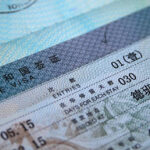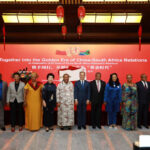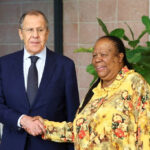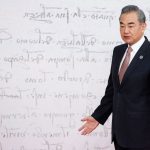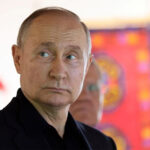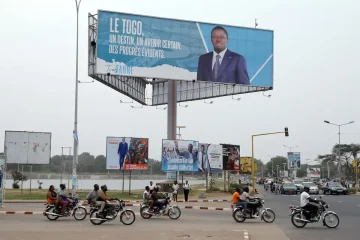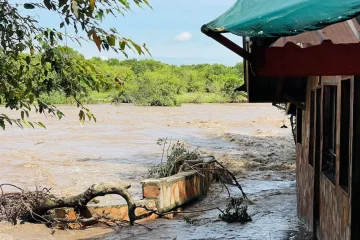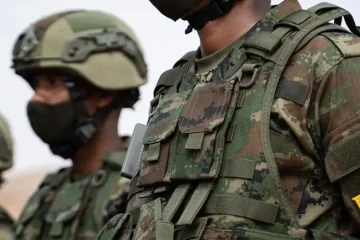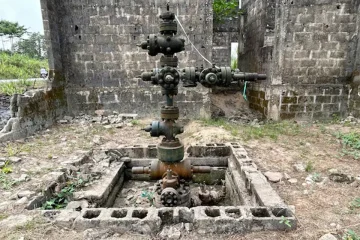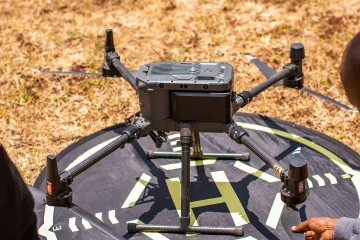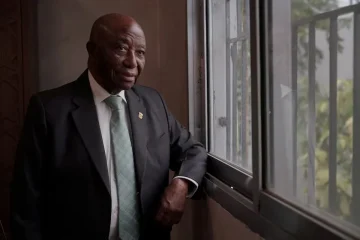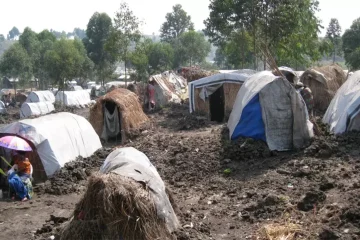THE close ties between China and South Africa are set to continue to flourish as the two nations seek to cement ties that have entered “the golden era”.
A mega-reception to mark the 25th anniversary of the establishment of diplomatic relations between SA and China was hosted by the Embassy of China in SA at its HQ in Acardia, Pretoria, today (Tuesday).
Former President Kgalema Motlanthe and his wife Gugu led a list of high-level public figures that included Dr Naledi Pandor, Minister of the Department of International Relations and Cooperation (DIRCO).
Other cabinet ministers included Dr Nkosasana Dlamini-Zuma, Minister for Women, Youth and Persons with in Disability, Lindiwe Zulu, Minister of Social Development, Pravin Gordhan, Minister of Public Enterprises, Enoch Godongwana, Minister of Finance, Stella Ndabeni-Abrahams, Minister of Small Business and Development and Thabang Makwetla, deputy Minister of Defence and Veterans. Former government minister, Maite Nkoana-Mashabane, also attended.
The ruling African National Congress (ANC) was represented by the party’s Secretary-General Fikile Mbalula and his 1st deputy, Nomvula Mokonyane.
As the red carpet was rolled out for celebrations and fond historical memories reminisced upon, it was impossible to sidestep the current pressing geopolitical challenges, particularly the wanton decimation of the Palestinian men, women and notably children.
So far, nearly 19,000 Palestinians have been killed in a protracted bombing spree by the Israeli Defence Force aided by the US military and its lethal weaponry.
Reflecting on the bilateral ties, Minister Pandor said: “This partnership, over the past 25 years, has shown that our strong bonds of friendship and solidarity have demanded a constant expansion in our areas of bilateral cooperation, but also that our commitment towards socio-economic growth and development transcends to the multilateral sphere, where both our countries share similar objectives towards promoting an international system which is free and fair, and where the interests of the developing countries are well-represented and considered.”
She continued: “The world is facing multifaceted geopolitical, socio-economic, environmental, and other global challenges, and, as friends, we need to stand together to seek just, responsible, and sustainable solutions jointly.”
Minister Pandor further called on China to work with South Africa in efforts aimed to “stopping the ongoing slaughter of Palestinians”.
The so-called “war on Gaza”, as some Western mainstream media outlets put it, has exposed deep divisions in the international governance system and in particular, the US-led Western double standards with regard to the care and safety of civilians during conflicts.
So far, some 7,700 Palestinian children have been killed in Israel’s indiscriminate bombing that the UN has decried as a deliberate form of “collective punishment”. Over 5000 women have also been killed, and thousands remain trapped under the rubble of collapsed residential buildings and shelters, including UN schools and hospitals, normally safe zones under international law.
Minister Pandor noted: “The international system is in flux, and it is our concern that the world will become increasingly divided unless South Africa and China, in unison, call for reform of the global governance system to make it more representative, equitable and relevant to address the current global challenges of peace and security, development, and global inequality.”
Also in 2010, the bilateral ties between the two nations were elevated a “Comprehensive Strategic Partnership”. This meant that China and SA were set to pursue cooperation in bilateral and multilateral fronts.
In pursuit of common interests in international organisations such as the UN, WHO and WTO, to mention a few, China and SA are intrinsically on the same side of the geopolitical slate.
The close ties bode well for SA. China is one of the five permanent members of the UN Security Council, with a veto power. The joint pursuit of geopolitical goals in the international institutions is therefore a welcome strategic partnership for Pretoria. Minister Pandor described the ties as “our ever-growing strategic partnership, marked by close fraternal bonds and deep solidarity”. The ties were first formulated by the then ANC Secretary-General Walter Sisulu in 1955 when he visited China “to solicit support for South Africa’s liberation struggle”.
As the cosy ties are taken to the next level, the two countries could build a community with a shared future that is premised on mutual endeavours.
Chinese Ambassador Chen Xiaodong delivered a keynote address. He painted a clearer picture of political and economic cooperation between Pretoria and Beijing. When the official diplomatic relations were established 25 years, said Amb Chen, “our bilateral trade volume was only around 1.6 billion US dollars”.
He added: “By 2022, our trade volume grew by almost 35 times to nearly 57 billion US dollars, which is equivalent to one-fourth of China-Africa trade.”
The growing bilateral ties have already seen some spin-offs for local commodities. SA beef, citrus, red wine, oysters, rooibos tea and other products have become very popular among the 1.4 billion Chinese consumers.
Amb Chen also revealed that “Chinese enterprises have invested over 25 billion US dollars in South Africa, which is over 100 times more than 1994 and also have created more than 400,000 local jobs”.
People-to-people diplomacy is also flourishing. Over the past 25 years, the number of people travelling between China and SA has increased tenfold.
“Among all African countries, South Africa built the most sister province and city relations with China, set up the most Confucius Institutes and classrooms, and hosts the largest number of Chinese students,” said Amb Chen. He also expressed great appreciation at the inclusion of the Chinese language into SA’s national education system. “Chinese culture and language have become more and more popular in South Africa,” Amb Chen said.
Since then, the ties have grown exponentially, benefiting both nations. For instance, over the last 25 years, China has become one of SA’s biggest sources of foreign direct investment, with stock stock valued at $25 billion.
China, the world’s second-largest economy after the US, uses a flagship programme called Belt & Road Forum for International Cooperation. It is Beijing’s strategy “that seeks to connect Asia with Africa and Europe via land and maritime networks”.
According to Amb Chen, “the aim is to improve regional integration, increasing trade and stimulating economic growth”. While the Belt & Road Cooperation is a global programme, China’s President Xi Jinping said China regard “South Africa as an important wheel in the cog for Africa as a whole”.
In fact, SA was the first African country to sign a Belt & Road Cooperation Memorandum of Understanding with China in 2015. It is credited with “causing robust growth that has greatly benefited both nations”.
Some of the benefits of the flourishing bilateral ties could be found in the field of energy. China has contributed some 244.5MW of wind power to SA’s misfiring electricity grid. They did this through Longyuan SA Renewable, a wholly-owned subsidiary of China’s State Power Investment Corporation’s Longyuan Power Group. Since 2011, the company has focussed its efforts inside SA on the development, construction and operation of renewable energy projects, particularly wind farms.
Some of China’s wind power projects in situated in the Northern Cape. They are known as De Aar1 AND De Aar11. They are credited with contributing to the development of infrastructure in the De Aar region, boosting the local economy, creating job opportunities for the locals and undertaking skills-transfer programmes as part of empowerment.
China and SA are also brought closer by their leadership role in BRICS-Plus, with Beijing having pushed hard for Pretoria’s acceptance into the then BRIC bloc. For the 13th year in a row, SA is China’s biggest trading partner in Africa.
There are several reasons why China-SA relations have made such glorious strides. Amb Chen explained: “The two sides have always enjoyed the strategic guidance of our leaders, especially President Xi Jinping and President Cyril Ramaphosa. During the past decade, President Xi paid four state visits to SA and steered the relations between our two countries forward from a strategic and long-term perspective. We always adhere to mutual respect and mutual trust. We support each other in exploring the path of development that suits our own conditions as well as on issues of our respective core interests and major concerns.”
Quite clearly, these are bilateral ties that have been founded on a solid foundation and continue to serve all sides very well. The camaraderie between Amb Chen and dozens of his embassy staff, as they freely mingled with SA government officials and invited guests from the diplomatic corps, academia, media and business explained the convivial relations that are clearly growing stronger between Pretoria and Beijing.

